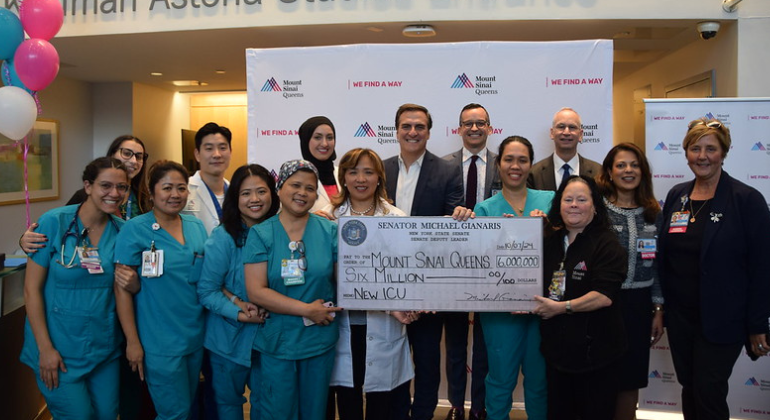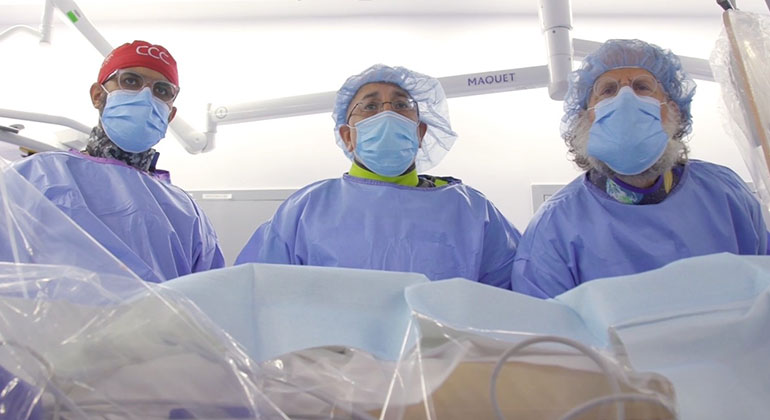Therapeutic Hypothermia Protocols in Use at Mount Sinai Queens
Mount Sinai Queens successfully uses hypothermia protocol for a young patient in Queens.
Therapeutic hypothermia is the medically supervised process of intentionally cooling down a patient’s body to lessen chances of brain damage in the aftermath of a heart attack. Recently, Mayor Michael R. Bloomberg announced new citywide protocols for first-responders using the hypothermia approach. Mount Sinai Queens has been using therapeutic hypothermia protocols since January 2009.
Two of several Mount Sinai Queens cases include a woman in her mid-50s and a 44-year-old man, both of whom suffered cardiac arrests. Thanks to the successful use of this hypothermia protocol by emergency medical technicians and Mount Sinai Queens physicians, these patients were revived. “Both patients recovered with little or no neurological damage,” says Aruna Timmireddy, MD, Chief of Critical Care at Mount Sinai Queens.
The non-invasive hypothermia device consists of cooling gel pads and a device that carefully controls the temperature of the water that is being pulled through the pads. With the device, a patient’s core temperature is gradually brought down to about 93°F for 24 hours. This cooling reduces inflammation and other secondary damages to the body and brain. The patient is then slowly warmed up to a normal temperature over another 24 hours. He or she is then ready for any further intervention.
Therapeutic hypothermia is indicated if a patient is experiencing cardiac arrest, has been successfully revived, and is still unconscious, among other criteria.
"Many patients leave the hospital walking and talking at the neurological levels they were before their cardiac event," says Cecilia Martin-Dabu, RN, Associate Director of Nursing for Critical Care and Clinical Nurse Manager of the Intensive Care Unit at Mount Sinai Queens.
About the Mount Sinai Health System
Mount Sinai Health System is one of the largest academic medical systems in the New York metro area, with 48,000 employees working across seven hospitals, more than 400 outpatient practices, more than 600 research and clinical labs, a school of nursing, and a leading school of medicine and graduate education. Mount Sinai advances health for all people, everywhere, by taking on the most complex health care challenges of our time—discovering and applying new scientific learning and knowledge; developing safer, more effective treatments; educating the next generation of medical leaders and innovators; and supporting local communities by delivering high-quality care to all who need it.
Through the integration of its hospitals, labs, and schools, Mount Sinai offers comprehensive health care solutions from birth through geriatrics, leveraging innovative approaches such as artificial intelligence and informatics while keeping patients’ medical and emotional needs at the center of all treatment. The Health System includes approximately 9,000 primary and specialty care physicians and 11 free-standing joint-venture centers throughout the five boroughs of New York City, Westchester, Long Island, and Florida. Hospitals within the System are consistently ranked by Newsweek’s® “The World’s Best Smart Hospitals, Best in State Hospitals, World Best Hospitals and Best Specialty Hospitals” and by U.S. News & World Report's® “Best Hospitals” and “Best Children’s Hospitals.” The Mount Sinai Hospital is on the U.S. News & World Report® “Best Hospitals” Honor Roll for 2024-2025.
For more information, visit https://www.mountsinai.org or find Mount Sinai on Facebook, Instagram, LinkedIn, X, and YouTube.
Mount Sinai Health System Celebrates Prestigious Magnet® Recognition
Sep 24, 2019 View All Press Releases
Mount Sinai Queens Celebrates Grand Opening of Its New Pavilion
Apr 26, 2018 View All Press ReleasesMount Sinai Queens Opens New Outpatient Imaging Facility
Jul 05, 2016 View All Press ReleasesMount Sinai Queens Opens New Expanded Emergency Department
Jun 09, 2016 View All Press Releases
